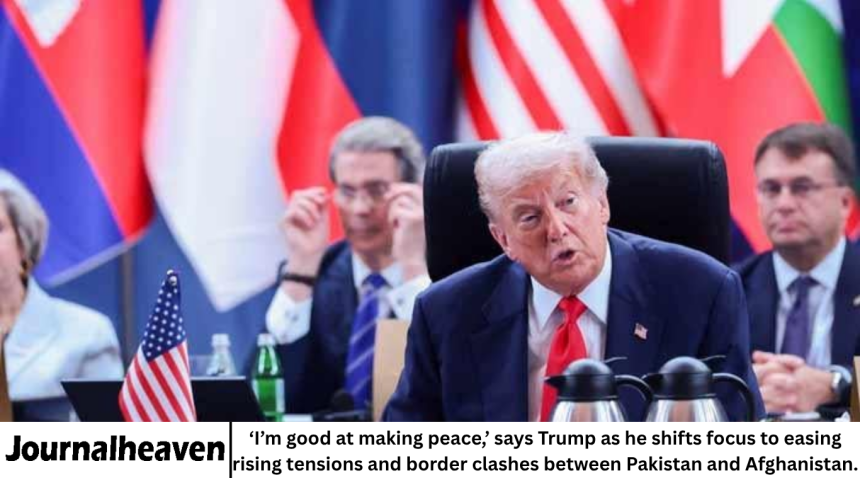Former U.S. President Donald Trump has shifted his focus toward rising tensions between Pakistan and Afghanistan, declaring that he’s “good at making peace.” His statement comes as reports of new border clashes between the two neighboring countries raise concerns of further instability in the region. Trump’s comments suggest he is positioning himself once again as a potential mediator in global conflicts, emphasizing his reputation for unconventional diplomacy and strong-handed negotiation.
- Trump’s Peace Message
- Background of the Border Tensions
- Trump’s History with Pakistan and Afghanistan
- Regional Reactions to Trump’s Statement
- The Strategic Importance of the Pakistan-Afghanistan Border
- Could Trump Mediate a Regional Peace Effort?
- The Broader Global Context
- Potential Steps Toward Peace
- What This Means for U.S. Foreign Policy
- Frequently Asked Questions
- Conclusion
Trump’s Peace Message
Donald Trump has long portrayed himself as a dealmaker capable of solving tough international disputes. His remark, “I’m good at making peace,” echoes his past approach to diplomacy — one built on direct engagement, bold statements, and high-stakes meetings.
Speaking to reporters, Trump said the escalating border tensions between Pakistan and Afghanistan concern him deeply. He suggested that the United States could play a constructive role in preventing the situation from worsening. His message focused on dialogue, stability, and regional cooperation — three elements often at the core of peace-building efforts.
Trump’s renewed interest in South Asian affairs has drawn both attention and skepticism. Supporters believe his straightforward style could help break the cycle of mistrust between the two nations, while critics question whether his involvement would bring lasting change.
Background of the Border Tensions
The Pakistan-Afghanistan border, known as the Durand Line, has been a source of tension for decades. Disputes over territory, migration, and militant activity have led to periodic clashes and strained relations between Islamabad and Kabul.
In recent months, reports of military exchanges, cross-border attacks, and the closure of key trade routes have heightened concerns. Both countries have blamed each other for escalating violence, while civilians living near the border face increasing hardship.
The region’s instability has implications far beyond its borders. Any major conflict could disrupt trade, fuel displacement, and increase security risks across South and Central Asia. For this reason, Trump’s call for peace efforts carries significant weight in international discussions.
Trump’s History with Pakistan and Afghanistan
During his presidency, Trump had a complex relationship with both Pakistan and Afghanistan. In 2018, he criticized Pakistan for not doing enough to combat terrorism and temporarily suspended military aid. However, by the end of his term, he emphasized improving ties and praised Islamabad for helping facilitate talks between the U.S. and the Taliban.
In Afghanistan, Trump made headlines by negotiating directly with the Taliban, leading to the 2020 Doha Agreement. The deal aimed to end America’s longest war and pave the way for a U.S. troop withdrawal. While opinions remain divided on its success, it demonstrated Trump’s willingness to pursue unconventional diplomatic paths.
Now, as he revisits South Asia’s challenges, Trump’s comments suggest he sees himself as uniquely qualified to mediate between two nations with whom he already has diplomatic experience.
Regional Reactions to Trump’s Statement
Reactions across Pakistan and Afghanistan have been mixed. In Pakistan, some officials and commentators welcomed Trump’s statement, viewing it as a positive sign that international attention is returning to their border issues. They noted that U.S. involvement, even informally, could help encourage both sides to pursue dialogue rather than confrontation.
In Afghanistan, however, responses were more cautious. Some leaders questioned whether Trump’s interest is genuine or politically motivated. Others expressed hope that any outside effort to promote peace would focus on fairness, respect, and sovereignty.
Analysts say Trump’s statement might also serve as a message to current U.S. policymakers, reminding them that he views diplomacy as a key area of strength should he return to office.
The Strategic Importance of the Pakistan-Afghanistan Border
The border between Pakistan and Afghanistan is not just a dividing line — it’s a geopolitical fault line with global consequences. For decades, it has influenced trade routes, migration patterns, and security cooperation in the region.
Pakistan sees border stability as essential to its national security, especially given ongoing challenges with militancy and refugee flows. Afghanistan, meanwhile, considers parts of the border dispute an issue of national identity and historical sovereignty.
Any peace initiative, therefore, must consider deep-rooted political, ethnic, and economic factors. The region’s tribes, who often straddle both sides of the border, add further complexity to the issue. Trump’s declaration may highlight his confidence in handling such challenges, but success would require sensitive negotiation and sustained international support.
Could Trump Mediate a Regional Peace Effort?
The idea of Trump mediating between Pakistan and Afghanistan is not far-fetched. During his presidency, he positioned himself as a broker in several high-stakes conflicts, including efforts between Israel and Arab nations, and early talks on the Korean Peninsula.
However, diplomatic experts caution that the situation in South Asia is uniquely complex. Historical mistrust, ongoing violence, and fragile political systems make any peace process difficult. While Trump’s direct style could spark dialogue, long-term stability would depend on continuous cooperation between both governments.
Nonetheless, Trump’s comment that he is “good at making peace” reflects his belief that personal leadership and bold negotiation can achieve results where traditional diplomacy often stalls.
The Broader Global Context
Trump’s focus on the Pakistan-Afghanistan border also comes at a time when the global community is grappling with multiple crises — from conflicts in the Middle East to economic instability in Asia and Europe. As major powers like China and Russia expand their influence in South and Central Asia, the U.S. faces pressure to reassert its diplomatic role.
By addressing the situation in Pakistan and Afghanistan, Trump not only highlights a key regional issue but also underscores his broader vision of American leadership abroad. His comments may also be seen as part of his larger strategy to project himself as a global problem-solver.
Potential Steps Toward Peace
If peace efforts move forward, several key steps would be necessary. First, both Pakistan and Afghanistan would need to engage in sustained dialogue, possibly facilitated by international organizations or neutral states.
Second, addressing the root causes of conflict — including border management, refugee repatriation, and economic cooperation — would be essential. Confidence-building measures, such as reopening trade routes and allowing cross-border humanitarian aid, could help reduce tensions.
Third, regional cooperation would play a major role. Neighboring countries like Iran, China, and India all have stakes in regional stability, and their involvement could either support or complicate peace efforts.
Trump’s role, if pursued, would likely be as an informal mediator — using his influence and reputation to encourage talks rather than leading official negotiations.
What This Means for U.S. Foreign Policy
Trump’s renewed interest in South Asia signals a possible shift in how future U.S. administrations might engage with the region. For years, American policy in Pakistan and Afghanistan has revolved around counterterrorism and security. A new focus on peace-building could open opportunities for economic and diplomatic partnerships.
However, it also raises questions about consistency. Critics argue that U.S. involvement must be long-term and multilateral, not dependent on individual leaders. Others believe that Trump’s personal approach could help cut through bureaucratic delays and revive stalled discussions.
Regardless of political perspectives, Trump’s remarks have once again brought global attention to a region that remains critical to international peace and stability.
Frequently Asked Questions
What did Donald Trump say about Pakistan and Afghanistan?
Trump said he is “good at making peace” and expressed interest in helping reduce border tensions between Pakistan and Afghanistan.
Why are Pakistan and Afghanistan in conflict?
The two countries have a long history of border disputes, cross-border attacks, and political mistrust linked to the Durand Line and regional security issues.
Has Trump been involved in South Asian peace efforts before?
Yes. As U.S. president, Trump played a major role in peace talks with the Taliban in Afghanistan and maintained diplomatic ties with Pakistan.
What is the Durand Line?
The Durand Line is the 2,640-kilometer border separating Pakistan and Afghanistan, drawn during British colonial rule in 1893.
How could Trump’s involvement affect U.S. foreign policy?
It could signal a renewed U.S. interest in South Asia, emphasizing diplomacy and mediation instead of solely focusing on security.
How have Pakistan and Afghanistan responded to Trump’s comments?
Reactions have been mixed — some view his remarks as constructive, while others see them as politically motivated or symbolic.
What are the next steps for peace in the region?
Both countries would need to begin formal dialogue, supported by international partners, to address security, trade, and humanitarian issues.
Conclusion
Donald Trump’s statement that he is “good at making peace” reflects his confidence in tackling one of South Asia’s most enduring challenges — the tension along the Pakistan-Afghanistan border. His renewed focus on the issue underscores both the urgency of resolving the conflict and his desire to remain a central figure in global diplomacy.
While his approach remains to be seen, the possibility of mediation offers hope for reducing violence and promoting dialogue in a region long plagued by mistrust and conflict. The road to peace will not be easy, but the attention it receives may help push both nations toward lasting stability.








